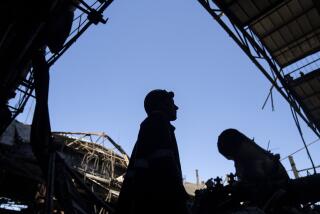Strike Action Spreads to Second Major Plant in Poland
WARSAW â Strike action spread to a second major industrial plant in southeastern Poland on Friday, and negotiators appeared to be stalled in their efforts to bring a quick resolution to the most serious labor unrest here since martial law was declared in 1981.
About 7,000 workers at the Stalowa Wola heavy machinery plant carried out their threat, made Wednesday, to stop working unless plant management grants a package of demands, which includes a $50-per-month pay increase (about 50% of their present wages) and reinstatement of two workers who were fired for organizing the strike.
The workers at the Stalowa Wola plant, which produces heavy equipment for the defense industry, join about 12,000 striking workers at another key industrial concern--the vast Nowa Huta steelworks near Krakow, which remained paralyzed for the fourth day as management refused to negotiate with the 16-man committee that says it represents 16,000 of the steel millâs workers.
Proceeded Cautiously
The government of Gen. Wojciech Jaruzelski, which came to power in 1981 in the midst of the labor upheaval that spawned the now-banned Solidarity trade union, so far has proceeded cautiously in dealing with the wave of strikes that hit Poland this week, fully realizing that labor unrest has brought down three postwar Polish governments.
The governmentâs position appeared to be delicate, since a forceful suppression of the strikes could lead to even more unrest. On the other hand, quick capitulation to worker demands seemed likely to bring similar demands from workers across the country, all complaining about price increases, averaging 42%, imposed since the first of the year under the governmentâs economic austerity plan.
It was clear Friday that the government is trying to draw the line and yet signal some flexibility, noting that wage increases could not be financed by the government but only by the enterprises able to support the pay increases with more efficient production or by raising prices for their products.
The governmentâs spokesman, Jerzy Urban, attempted to play down any air of crisis within the government Friday, declaring that the âthe situation in Poland is not dramatic.â
Nevertheless, police arrested Jacek Kuron, a leading Solidarity activist, who told reporters shortly before his arrest that about 25 Solidarity leaders had been detained in the past two days. They included Warsaw Solidarity leader Zbigniew Bujak, national spokesman Janusz Onyszykiewicz and Solidarity adviser Bronislaw Geremek, who was later released.
Moreover, a heavy police presence in Stalowa Wola seemed intended as a show of force, even though the government has not yet threatened to enter the plant to remove the striking workers.
Walesa Appeals for âReasonâ
Solidarity leader Lech Walesa, in a statement issued by one of his aides, said that the government is contemplating the use of force. âI appeal to authorities to maintain reason,â he said.
Before his arrest, Kuron said that workers in several other plants had declared âstrike alertsâ and were ready to halt work if the authorities used force to end the strikes at either of the two big plants.
Solidarity sympathizers in the city transport company of Krakow issued a statement calling for a strike to begin at 6 a.m. today, pledging to remain on strike until the demands of the nearby Nowa Huta workers are satisfied.
The wave of strikes began Monday in the western Polish towns of Bydgoscsz and Inowroclaw, when 2,800 bus and tram drivers stopped work for 11 hours to demand a 60% wage increase and changes among management personnel. The demands were quickly met.
The rapid acceptance of the transit workersâ demands seemed to cement a growing perception among Polish workers that the government, fearing the outbreak of any strike, would rapidly cave in to their demands.
That idea had been steadily growing since February, when the government announced its package of price increases. The price hikes were to be softened by wage increases of about $24 per month for most workers. Within weeks, however, workers in factories around the country demanded and received wage increases exceeding the governmentâs guidelines.
Economists, many of them writing in the official press, have sounded warnings of an inflationary wage-price spiral and warned that continued wage demands could not continue to be met without leading Poland toward an even deeper economic crisis.
Polish Labor Minister Ireneusz Sekula said Friday that wages in Poland have gone up 45% in the last three months, while price increases have totaled 42%.
He said the government is devising a new taxation system for state enterprises, which could allow some concerns to pay more in wages to their workers. Both Sekula and Urban, however, emphasized that the government could not provide the funds for higher pay.
While the comments of the two officials suggested a conciliatory approach, Urban also said that the strike at Stalowa Wola was illegal--since strikes in defense-related industries are forbidden by law--and that workers joining the strike would be fired.
It remains doubtful, however, that the government is yet prepared to fire almost half of the 18,000-person work force at the plant, an action that could set off other protests and harden the determination of the steel workers at Nowa Huta, which employs 32,000.
More to Read
Sign up for Essential California
The most important California stories and recommendations in your inbox every morning.
You may occasionally receive promotional content from the Los Angeles Times.










